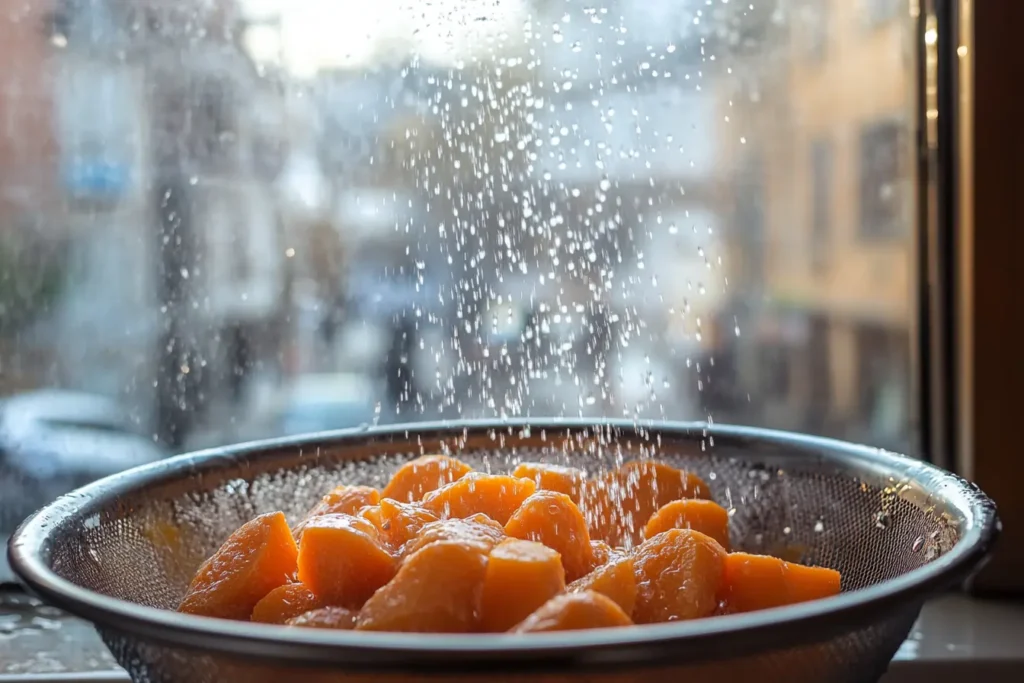Table of Contents
Canned sweet potatoes are a pantry staple for many households, offering a convenient way to enjoy the delicious taste and nutritional benefits of sweet potatoes without the hassle of peeling, chopping, or cooking from scratch. But have you ever wondered: Should I rinse canned sweet potatoes?
This seemingly simple question has sparked debate among home cooks and chefs alike. The answer depends on several factors, including your recipe, health goals, and flavor preferences. In this guide, we’ll explore when rinsing is beneficial, when it’s not, and how to make the most of canned sweet potatoes in your cooking.
Rinsing canned sweet potatoes can influence the flavor and healthiness of your dishes. In the next sections, we’ll break down everything you need to know about this important kitchen step.
What Are Canned Sweet Potatoes?
Canned sweet potatoes are pre-cooked sweet potatoes preserved in cans, often packed in either a light syrup, heavy syrup, or plain water. These products are a lifesaver when you need a quick and easy way to prepare sweet potato-based recipes without the effort of peeling, boiling, or baking fresh sweet potatoes. They retain much of their original flavor, texture, and nutritional value, making them a versatile option for a variety of dishes.
How Are Canned Sweet Potatoes Processed?
The canning process starts with fresh sweet potatoes that are peeled, sliced, and cooked. After cooking, they are packed into cans, usually with a preserving liquid such as water, syrup, or brine. The cans are sealed and heated to high temperatures to eliminate bacteria, ensuring the product’s shelf stability.
While this process preserves the sweet potatoes’ natural flavors and nutrients, it can also leave behind excess sugars or salts from the packing liquid. This is why some people choose to rinse them before use.
Quick Fact: The syrup or brine in canned sweet potatoes can contain up to 25% of your daily sodium intake or significant added sugars, depending on the brand.
Should You Rinse Canned Sweet Potatoes?
The decision to rinse canned sweet potatoes depends on your cooking goals and personal preferences. In this section, we’ll explore when rinsing is beneficial and when you can skip this step.
When Rinsing Is Beneficial
Rinsing canned sweet potatoes can make a noticeable difference in the following situations:
- Reducing Excess Sweetness or Saltiness: If the sweet potatoes are packed in syrup or brine, rinsing removes some of the added sugars and sodium. This is particularly useful for savory recipes where sweetness might overpower other flavors.
- Improving Recipe Adaptability: Recipes like soups, stews, or casseroles often benefit from rinsed sweet potatoes to better balance flavors and achieve the desired consistency.
- Healthier Cooking: If you’re watching your sugar or sodium intake, rinsing is an easy way to reduce these elements while still enjoying the benefits of canned sweet potatoes.
When You Can Skip Rinsing
In some scenarios, rinsing canned sweet potatoes might not be necessary:
- When Using the Syrup as an Ingredient: In desserts or recipes like sweet potato pies, the syrup adds natural sweetness and enhances the dish.
- To Preserve Flavor: The packing liquid can intensify the sweet potato’s flavor, which can be advantageous in specific dishes.
- For Quick Snacks: If you’re eating the sweet potatoes straight from the can or as a simple side dish, rinsing might not be needed.
Pro Tip: Always check the label on your canned sweet potatoes. Some brands offer low-sodium or unsweetened options, which might eliminate the need for rinsing entirely.
How to Rinse Canned Sweet Potatoes Properly
Rinsing canned sweet potatoes is a straightforward process, but doing it correctly ensures you don’t compromise their texture or flavor. Here’s a step-by-step guide to help you rinse them properly.

Tools You’ll Need
- A colander or fine mesh strainer
- A bowl or sink with access to clean, running water
- Optional: A spatula or spoon for gently stirring
Step-by-Step Instructions
- Open the Can: Use a can opener to remove the lid and carefully pour out the liquid into the sink or a separate container if you plan to save it for another use.
- Pour Sweet Potatoes Into a Colander: Gently transfer the sweet potatoes from the can into a colander placed in your sink.
- Rinse with Cold Water: Run cold water over the sweet potatoes, ensuring that each piece is thoroughly washed. Avoid hot water, which can soften the potatoes too much.
- Stir Gently: Use a spatula or your hands to gently move the sweet potatoes around in the colander, ensuring all surfaces are rinsed.
- Let Excess Water Drain: Allow the rinsed sweet potatoes to sit in the colander for a few minutes to remove any extra water before using them in your recipe.
Tips for Optimal Rinsing
- Handle Gently: Canned sweet potatoes are softer than fresh ones, so handle them carefully to avoid breaking them apart.
- Don’t Over-Rinse: While rinsing removes excess syrup or salt, over-rinsing can also wash away some of the natural flavor.
- Save the Liquid: If you’re making a recipe that calls for extra sweetness or moisture, consider saving the syrup to use as a sweetener in another dish.
Quick Fact: Studies show that rinsing canned vegetables, including sweet potatoes, can reduce sodium levels by up to 40%, making it a healthier option.
Benefits of Rinsing Canned Sweet Potatoes
Rinsing canned sweet potatoes can significantly impact your cooking results and overall health. Let’s take a closer look at the key benefits.
Flavor Benefits
Rinsing canned sweet potatoes removes the syrupy coating or briny taste, allowing their natural sweetness to shine. This is especially important in savory recipes, where a clean flavor is preferred.
For example:
- In soups or stews, unrinsed sweet potatoes can make the dish too sweet.
- In casseroles, rinsed sweet potatoes blend better with other ingredients, creating a balanced flavor profile.
Health Benefits
For health-conscious cooks, rinsing canned sweet potatoes offers these advantages:
- Reduced Sodium: Removing brine or salted water reduces sodium content, helping you manage your salt intake.
- Lower Sugar: Syrupy sweet potatoes contain added sugars that can be rinsed away for healthier meals.
- Better Digestibility: By washing away preservatives or excess sugar, rinsed sweet potatoes may be easier to digest for some individuals.
Pro Tip: Pair rinsed canned sweet potatoes with fresh herbs and spices like rosemary or cinnamon for enhanced flavor without extra calories.
Recipes Using Canned Sweet Potatoes

Canned sweet potatoes are incredibly versatile and can be used in various recipes, both savory and sweet. Below are two popular dishes, along with tips on when and why to rinse the sweet potatoes.
Mashed Sweet Potatoes
Mashed sweet potatoes are a classic side dish perfect for any occasion.
Ingredients:
| Ingredient | Quantity |
|---|---|
| Canned sweet potatoes | 2 cans (15 oz each) |
| Butter | 2 tablespoons |
| Milk or cream | ¼ cup |
| Salt and pepper | To taste |
Instructions:
- Rinse (Optional): If the canned sweet potatoes are packed in syrup, rinsing them helps create a more savory dish. For sweeter mashed potatoes, skip this step.
- Heat: Warm the sweet potatoes in a pot or microwave until soft.
- Mash: Use a fork or potato masher to mash the sweet potatoes.
- Mix: Add butter, milk, salt, and pepper, and mix until smooth.
- Serve: Garnish with parsley or a sprinkle of cinnamon for added flavor.
Pro Tip: For a lighter version, substitute milk with almond milk and reduce the butter.
Sweet Potato Casserole
A family favorite, sweet potato casserole is a dish where the decision to rinse is crucial.
Ingredients:
| Ingredient | Quantity |
|---|---|
| Canned sweet potatoes | 2 cans (15 oz each) |
| Brown sugar | ¼ cup |
| Butter | 3 tablespoons |
| Pecans | ½ cup (chopped) |
| Mini marshmallows | 1 cup |
Instructions:
- Rinse: For a less sweet casserole, rinse the sweet potatoes to remove the syrup. For traditional sweetness, skip rinsing.
- Mash: Lightly mash the sweet potatoes in a mixing bowl.
- Layer: Spread the sweet potatoes in a baking dish. Top with brown sugar, pecans, and marshmallows.
- Bake: Bake at 350°F (175°C) for 20–25 minutes, or until the marshmallows are golden brown.
- Serve: Allow to cool slightly before serving.
Quick Fact: A standard serving of sweet potato casserole contains over 50% of your daily vitamin A requirement!
FAQs About Rinsing Canned Sweet Potatoes
Does rinsing affect nutrients?
Rinsing canned sweet potatoes has a minimal impact on their nutrients. While some water-soluble vitamins might be slightly reduced, the overall nutritional value remains high. The health benefits of reduced sodium and sugar outweigh the minor loss of nutrients.
Can you eat canned sweet potatoes without rinsing?
Yes, canned sweet potatoes are safe to eat directly from the can without rinsing. However, if you’re concerned about excess sugar or salt, rinsing is recommended.
How does rinsing change the texture?
Rinsing can slightly reduce the soft texture of canned sweet potatoes by removing their coating, but it won’t significantly alter their consistency. Handle them gently to maintain their integrity during rinsing.
What happens if I rinse too much?
Over-rinsing might wash away some of the natural sweetness and flavor of the sweet potatoes. It’s best to rinse just enough to meet your recipe or dietary needs.
Is rinsing necessary for all recipes?
No, rinsing isn’t always necessary. It depends on the recipe and your taste preferences. For desserts or dishes requiring extra sweetness, you might prefer skipping the rinse.
Are there low-sodium or no-sugar canned sweet potatoes?
Yes, many brands offer low-sodium or unsweetened canned sweet potatoes. These options may eliminate the need for rinsing.
Conclusion
Deciding whether to rinse canned sweet potatoes depends on your culinary goals and preferences. Rinsing offers several benefits, such as reducing excess sugar and sodium, enhancing flavors in savory dishes, and promoting healthier cooking. However, in sweet recipes or when using the packing liquid as an ingredient, skipping the rinse can save time and preserve the desired sweetness.
By understanding the nuances of canned sweet potatoes, you can make informed decisions that align with your recipe requirements and health objectives. Whether you choose to rinse or not, these convenient pantry staples are a fantastic addition to countless dishes. So, the next time you reach for a can, you’ll know exactly how to handle it for the best results.


1 thought on “Should I rinse canned sweet potatoes?”